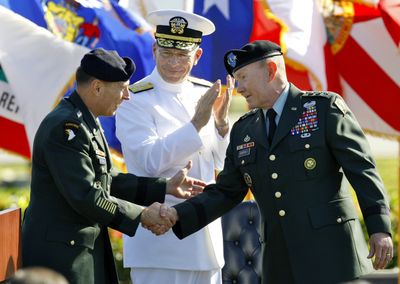Petraeus to revamp Afghan plan
New Centcom boss weaving together overarching strategy

MACDILL AIR FORCE BASE, Fla. – The most important task for Gen. David Petraeus, installed as head of U.S Central Command, will be developing a single coherent strategy for Afghanistan, Defense Secretary Robert Gates said Friday.
Petraeus took command of Centcom and responsibility for overseeing the wars in Iraq and Afghanistan at a ceremony Friday at MacDill Air Force Base near Tampa.
Petraeus was the top U.S. commander in Iraq. Now, as the top regional commander, he will continue to oversee that war, but at Centcom, his most urgent task will be helping to craft a new strategy for the war in Afghanistan.
“Under his leadership our troops have dealt our enemies in Iraq a tremendous blow,” Gates said. “Now he will take aim at our adversaries in Afghanistan.”
Later in the day, during a news conference aboard his plane, Gates said that Petraeus will have to find a way to weave together various ongoing military reviews of the Afghanistan war into a single strategy as well as to better coordinate various reconstruction efforts.
“We’ve got four or five different strategies going on right now. At some point all of that has to come together and we need to have one coherent plan that everyone signs up for,” Gates said.
The conflict in Afghanistan has grown more violent this year. In its closing days, the Bush administration National Security Council has initiated a broad strategy review. The Joint Chiefs of Staff also have a planning effort under way, designed in part to present options to the next administration. Petraeus is working on his own plan for Afghanistan. In addition, NATO is also engaged in a strategic planning effort.
For all the efforts, a crucial question concerns the number of troops needed. President Bush has announced that an additional Army brigade, about 3,500 soldiers, will go to Afghanistan early next year. But U.S. commanders in Afghanistan have said they need as many as 20,000 more troops.
Gates said he had briefly discussed with Petraeus the appeal from commanders in Afghanistan for three additional brigades. That request has not formally been presented to Gates, but he said he told Petraeus he thought it was something the United States should “satisfy in the course of 2009.”
Still, Gates sounded skeptical about the need for additional troops beyond those brigades and said U.S. allies were unlikely to send more troops.
“What I would like to see and I think what everybody would like to see is the most rapid possible further expansion of Afghan military forces,” Gates said, “because this needs to be an Afghan war and not an American war and not a NATO war.”